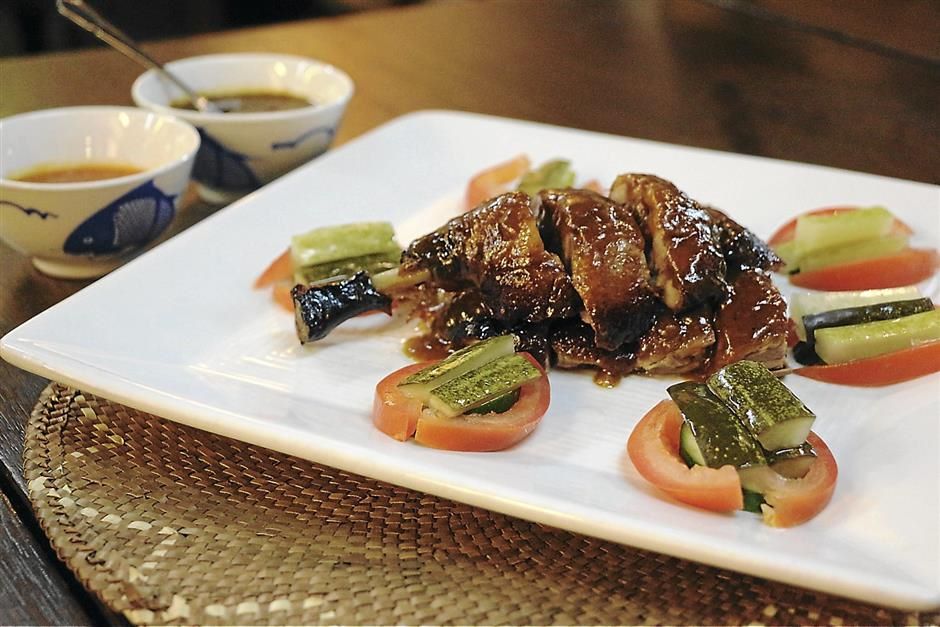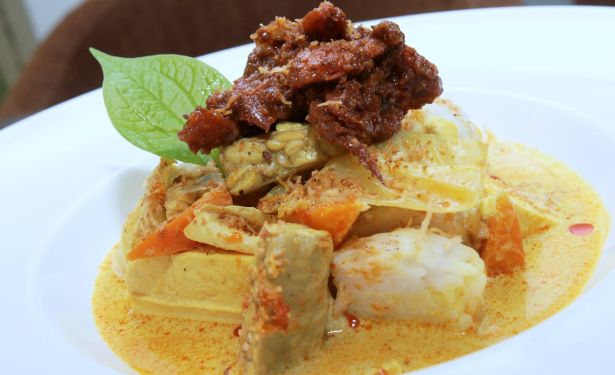Jessica Johnson Tea Room
16G, Jalan Cempaka SD12/2
Bandar Sri Damansara
Selangor.
Tel: 03-6275 6755
Business hours: Tues-Thurs: 8.30am-5.30pm,
Fri-Sun: Noon- 9.00pm, closed on Mondays
Aside from the expected Western dishes, an English tea room offers surprisingly good Nyonya food too.
EVERYTHING is not quite what you expect,” remarked one of my dinner companions, Carsten. In saying that, he pretty much encapsulated the whole essence of Jessica Johnson Tea Room.
The name itself is reminiscent of an English countryside bakery, and certainly, the décor tries very much to capture that mood. It has large vases of brightly coloured (plastic) flowers, porcelain floral teapots with teacups to match, and rose-print padded chairs – you can’t get any more English than that.
Considering how it’s housed in a shoplot in suburban Sri Damansara, Selangor, alongside a mamak coffeeshop, post office, mom-and-pop sundry shops, it’s not exactly an upmarket Bangsar area. In fact, it seemed somewhat out of place.
Owner Mark Chin offered more clarity to the concept. The founder of Mark Design Interiors, Chin opened the lifestyle cafe and restaurant Passion Road in the late 1990s in Damansara Heights, Kuala Lumpur.
One of the pioneers to introduce the concept of private dining in a bungalow in Malaysia back then, he sold it a few years later and moved on to do other things. Only of late, Chin decided to go back to one of his first loves, home-style cooking.
His propensity for the eccentric is reflected in his not-so-new restaurant (now four years old) that’s cramped with an odd assortment of wood furniture – mostly of Indonesian origin, some antiques, some reproduction pieces – juxtaposed against the English setting.
It could very well pass for a curiosity shop, bordering on tacky; most of the pieces on display, including the tables where food is laid and chairs which diners sit on, are for sale. The menu is scribbled on pieces of paper, casually bound together. A work in progress, assured Chin.
Earlier on, the four of us had exchanged furtive glances, not entirely convinced of the culinary journey ahead.
“Order anything you like,” said Chin. Most restaurants would have feted the reviewer with their best signature dishes. Here, we were left to chance. Either he wasn’t familiar with how restaurant reviews worked, or he was that confident of his food.
Fortunately, everything churned out of the kitchen had us licking the plates clean, eagerly looking forward to the next dish.
To stay true to English fare, there was the traditional chicken pie. But what grabbed our attention was the Nyonya Chicken Pie (RM10). Chunky pieces of chicken ensconced in mild Nyonya red curry fell out of the generously filled pie as we divided it among the four of us.
Freshly baked twice daily, those who can’t get enough of this unusual pie can also buy it frozen and bake it at home.
“It’ll still taste great,” Chin assured, and surely, the smell of freshly baked pie wafting in the air will be irresistible.
The accompanying coleslaw was thankfully not lazily drenched in mayonnaise like most commercial establishments, but drizzled with his special dressing that comes with a hint of young and old ginger, balsamic vinegar and toasted sesame.
Why the name Jessica Johnson? He explained that it was inspired by his “surrogate” mum, whom he had gotten to know when working as a farmhand for four years while studying in Leeds, England, years ago. The pie was “Jessica-inspired”, he added.
“She understood me so much better than my real mum
(who’s typical Shanghainese),” he volunteered. The Nyonya influence comes from his Baba father, but it was his father’s sister who taught him the fine nuances of Nyonya cooking.
From here on, the food took on a more Asian course.
A quarter roast duck (Hong Kong style) turned out to be plenty even for just one person. Ranging from RM20 up to RM60 for a whole bird, the succulent flesh had subtle hints of Chinese herbs under the crisp skin, and the dish comes with a side of pickled cucumber.
Something more exotic, the Balinese Lemongrass Chicken is made by combining 20 stalks of lemongrass with five drumsticks, along with cekur (gingler-like rhizome, from the galanga family) and pineapple bits. A single drumstick per serving comes with a generous dose of fragrant ground herbs and spices, which surprisingly doesn’t contain santan (coconut milk).
A spin-off of the conventional Hainanese Chicken Chop, JJ’s version was Asian fused with Western influences. The robust rich gravy was hard to peg in just one mouthful and begged for further inspection as it teased my taste buds. Marinated with salt, the breast meat was lightly pan-fried before being braised in a tomato-based sauce peppered with garlic, onion, ginger and other condiments. The gravy would be great with a bagette, suggested my friend Sheila. I personally found it a bit on the sweet side but everyone else lapped it up.
Let’s not have Black Pepper Chicken despite the “Hong Kong style” in the name as it’s so predictable, I said. Carsten, who’s German, wasn’t too keen either, abhorring most Malaysian interpretations. But we had it anyway, and he liked JJ’s version as it was different, maybe because of the ginger, cekur, sesame oil and special Hong Kong black sauce that gave the gravy a unique slight smoky flavour.
The Balinese Chicken Curry was also complex in taste as was the Thai Duck Curry, which was less oily and had a more mellow flavour. Slowly simmered to perfection, the thick and spicy Chicken Rendang was very appetising, a fitting tribute to Chin’s Nyonya heritage. Even the strictest of non-carbo eaters would find it hard to resist some rice to soak up the rich piquant dry curry.
If there is one criticism, it would be that JJ’s menu was overladen with poultry dishes, save for one Assam Fish (not available that day) by special order. That, explained Chin, was because he was very particular about the freshness of fish.
“Once you do something, do the best you can,” he exclaimed, and that’s why he would rather not serve fish.
Assailed by so many strong, full-bodied concoctions, I almost wished there was clear bland soup, if only to wash the palate, before savouring dessert, which was either yummylicious Apple Pie or Light Jamaican Fruitcake.
JJ used to be open only for lunch and catering services, but due to popular demand, said Chin, he recently decided to extend hours to include dinner for weekends. Lunch sets start from RM15.90 and come with coffee or tea, which is a pretty good deal.
I thought the menu on the whole was very brave as Nyonya food takes a lot of preparation and ingredients. Chin manages to deliver, proving there are no shortcuts to good food. The name though does seem a little misguided, because other than the pies and decor, there is very little English content in this restaurant’s food. Perhaps, the tea room should add a new tagline to its name – “expect the unexpected”.







